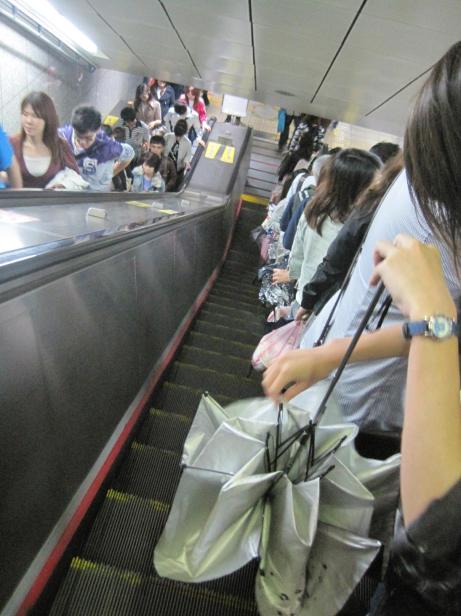I often experience different intercultural behaviors when I am travelling to a foreign country. They could be related to the individuals’ cultural values, beliefs, and languages, etc.
There was this incident that happened last year when a few of my friends and I went to Taiwan on a short vacation. After a long tiring day, we were at the train station on our way back to our hotel. It was rather crowded at that time as it was peak hour. We walk towards the side of the train door and waited as how we would usually do when we were Singapore. Then, one lady in the mid-40s tapped on my friend on his shoulder. She looked quite pissed and told us that we had to queue in line to wait for the train. That was when we suddenly realised that there were actually lines properly drawn on the floor to indicate where to queue for the train and the Taiwanese people were all queuing orderly in one straight line before boarding. Also, when they were going up the escalator, they would all keep to the side of the escalator so that there is a clear path for the people who are in a hurry.
This example clearly shows that there were cultural differences between Singaporeans and Taiwanese. In Singapore, people would never queue patiently like that before boarding the MRT. They would simply crowd outside the MRT door and try to rush into the train whenever they have a chance. Although we do a rule to keep to the left when we are on the escalator, we often do still see people standing on the right side chatting away while blocking all the people behind them. All this differences simply mean that Singaporeans and Taiwanese have different values and beliefs. Therefore when travelling to other countries, it is always good to be observant and try to look out for values or practices that are different from your own country. We need to understand the fact that people in other country will have a different set of culture and values and we should not assume that what we usually do or say in your country are acceptable in another.


Hi Weisong,
ReplyDeleteI have the same sentiments as you do. I really admire the attitude of commuters in Taiwan and some other countries like Japan. The commuters in these countries queue up in an orderly fashion no matter whether it is peak hour or non-peak.
When I do see this kind of orderly queues in Singapore, I actually took photos of them because those are rare occurrences!
Hi Wei Song and Jestina,
DeleteThis is an interesting post. It clearly shows difference between Singapore and Taiwan.
In my opinion, I do not find queue is rare in Singapore as Singapore is nice and orderly. I often see the Singaporean queuing for food. In Thailand, the queue is less tidy that Singapore and if there is a queue, you have to protect your own slot carefully; otherwise, others will take your place!
I know a Thai professor who have been teaching the Thai language course in NUS. I asked her whether she wanted to go back to Thailand or not. She said she wanted but now she had already used to the new environment in Singapore after staying for 20 years. Nowadays, she find difficulty when she goes back to Thailand as it is not as neat as Singapore. For example, the way people queuing here is different from that of Thailand which is less neat.
Hi Wei Song,
ReplyDeleteThank you for sharing this intercultural experience. I definitely agree with the fact that countries like Japan and Taiwan are very disciplined and function in an orderly manner.
Belonging to Singapore you thought that Taiwan has more discipline than Singapore. Let me warn you, if you ever visit India and do not see a queue even in banks and other common places don't be shocked. :P
As I have suggested others, it is always advisable to go around with a local friend in a new area. This is what I did when I came to Singapore. One of my local friends helped me go around the place and get familiar with the way things work here. It helped me to a great extent.
Some sentences that can be improved:
1) and waited as how we would usually do when we were Singapore.
>> and waited as we would usually do when we were Singapore.
2) Then, one lady in the mid-40s tapped on my friend on his shoulder.
>>Then one lady in her mid-40s tapped on my friend's shoulder.
3) shows that there were cultural differences between Singaporeans and Taiwanese
>>shows that there are cultural differences between Singaporeans and Taiwanese
4) we do a rule to
>> we do have a rule to
5) often do still see
>>often still see
6) All this differences
>>All these differences
Thanks, it was an interesting read!
Aditi
Thanks, Wei Song, for this explanation of the different norms between Singapore and Taiwan for entering a train car. I've read of such a difference before (perhaps even in a blog post) and I have a vague recollection of experiencing lines for bullet train car entry in Japan. You mention that this is connected to differing "values and beliefs." I'd like to hear more about that. Couldn't it be argued very simply that it's just a rule that was instituted in Taiwan? I'll grant you that it has significance. But cultural?
ReplyDeleteIt is fun and exciting to travel, but isn’t always best to come home, to everything you are used to, to the normal? In Sweden we act comparable to Singapore in terms of queuing systems. Sure, we have queues, but there are no strict queues like you just described. Spontaneously, it feels very stiff and impersonal. But I guess it's for practical reasons as well, that there is such an order.
ReplyDelete